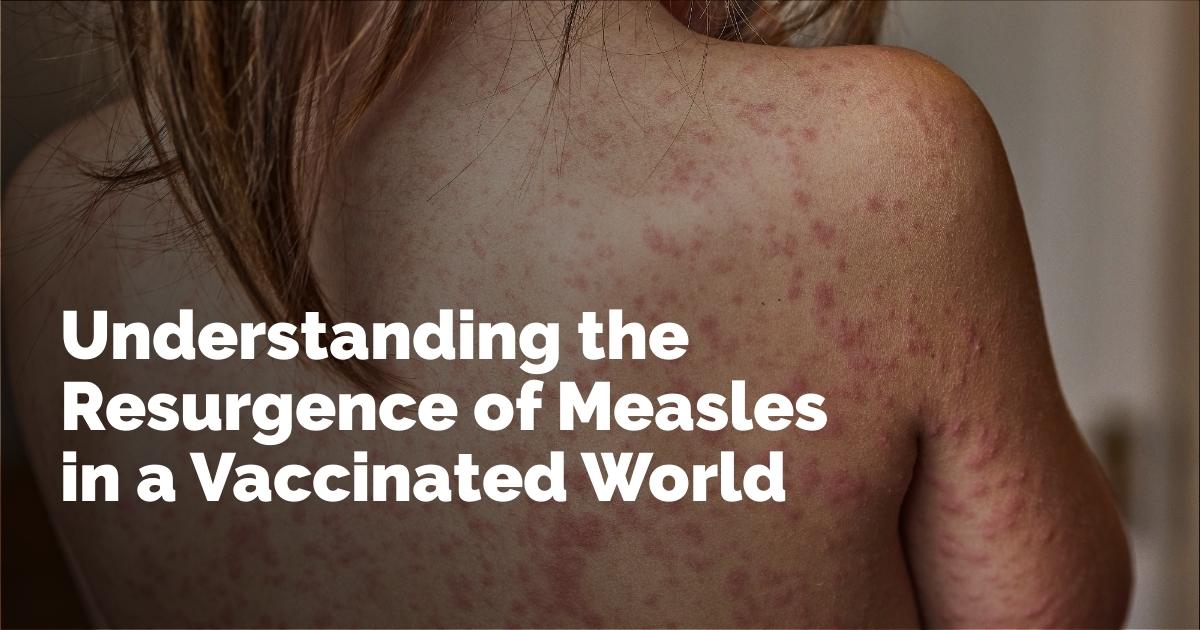Why Measles Is Re-Emerging: An In-Depth Exploration
Introduction to Measles
Measles, a disease that's been well-controlled thanks to vaccines, is making a startling comeback. This illness, caused by a virus from the genus Morbillivirus, is highly contagious and spreads quickly through respiratory droplets. The symptoms are quite severe and distinctive, including a well-recognized red rash, cough, high fever, inflamed eyes, and a runny nose. The most vulnerable groups are infants and young children under five, especially those who are unvaccinated or have compromised immune systems.
Since the introduction of a safe and effective vaccine in 1963, there was significant hope to eradicate measles, particularly in countries like the United States. However, in areas where vaccination coverage is low, measles continues to be a formidable global health challenge, contributing substantially to child mortality, especially among those who are unvaccinated.
The Resurgence of Measles
In recent years, the resurgence of measles has taken health experts by surprise. In 2024 alone, the European Union/European Economic Area (EU/EEA) witnessed over 35,000 cases, a tenfold increase from the prior year, with a majority of these being in unvaccinated individuals. The U.S. has also been affected, with over 220 confirmed cases reported as of March 2025, notably affecting children five years and younger.
This resurgence comes with serious complications, such as pneumonia, encephalitis, and subacute sclerosing panencephalitis (SSPE), which pose significant health risks, particularly to young and immunocompromised individuals. Regional outbreaks in the U.S. have been concentrated in states like Texas, New York, and California, areas known for both high population density and notable vaccine exemption rates.
Romania, a notable hotspot, accounted for nearly 87% of the EU/EEA cases in 2024, highlighting a troubling trend seen in other high- and middle-income countries where vaccine coverage has slipped below the critical 95% threshold necessary for herd immunity.
The Role of Vaccine Hesitancy
The resurgence of measles is not a failure of science but rather a consequence of poor communication, declining trust in authorities, and policy setbacks. Vaccine hesitancy, characterized by the refusal or delay in accepting vaccines despite their availability, is a significant force behind the return of measles.
This hesitancy is exacerbated by misinformation, most persistently the unfounded claim linking the measles, mumps, and rubella (MMR) vaccine to autism. Social media has become a potent amplifier for these misleading narratives, often outpacing public health responses and contributing to a decline in parental confidence in vaccines.
Furthermore, the distrust in government and medical institutions, fueled by the politicization of health issues during the COVID-19 pandemic, has further reduced vaccine uptake. Non-medical exemptions, based on religious or philosophical grounds, have also promoted under-immunized populations and facilitated outbreaks in regions not limited by vaccine availability.
Consequences Beyond Infection
The impact of each measles outbreak extends far beyond individual health concerns and places a considerable strain on healthcare systems. Containing such outbreaks necessitates thousands of hours spent on contact tracing, emergency immunizations, and issuing public health advisories. Notably, costs for managing outbreaks can skyrocket, with expenses per individual case ranging from $48,000 to $142,000, reflecting the extensive resources required for laboratory testing, post-exposure prophylaxis, and widespread emergency vaccination initiatives.
These financial implications were notable during the 2019 New York outbreak, which alone demanded over $8.4 million in public health expenditures. Thus, it becomes evident that funds earmarked for managing outbreaks could be more cost-effectively used in routine immunization programs, further highlighting the crucial economic benefits of prevention over treatment.
The resurgence of measles poses a significant threat to sensitive groups: infants too young for vaccination, immunocompromised individuals, and pregnant women, who are at particular risk of severe outcomes.
Counteracting the Crisis
Efforts to tackle the measles crisis have been multifaceted. In many regions, public health bodies have rolled out large-scale vaccination drives and declared public health emergencies to swiftly vaccinate unvaccinated communities. Some jurisdictions have adjusted policies, notably removing non-medical exemptions for school-aged children, to ensure higher vaccination rates.
For example, following a significant outbreak connected to Disneyland, California's legislative actions led to improved MMR vaccine coverage. Engaging the community is another effective strategy, where health professionals work alongside local advocates to educate the public about the benefits of vaccines and dispel persisting myths.
Interactive campaigns, using methods like workshops, social media engagements, and school-based programs, have shown promise. Tailoring these educational efforts to address the specific concerns and values of each community has shown to reverse some vaccine hesitancy. Nevertheless, these efforts require sustained investments and collaboration between governments and communities to ensure broad and longstanding vaccination compliance.
Looking Ahead
To reclaim control over measles and other preventable diseases, a comprehensive, deeply integrated approach is required. Rebuilding public trust in medical institutions is critical and depends on open, empathetic, and consistent outreach efforts. Educational campaigns need to be culturally sensitive and region-specific, emphasizing both the safety of vaccines and the dangers of ignoring preventable diseases.
Technological innovations, such as microarray patches, are emerging as promising tools to enhance vaccine uptake by eliminating the fear of needle-based delivery and optimizing distribution logistics.
Ultimately, effective management of measles hinges on robust global coordination, aiming to fortify disease surveillance systems, enhance routine immunization programs, and ensure prompt outbreak responses without discrimination regarding a region's resources. This multi-pronged strategy is crucial for safeguarding public health from the recurrence of preventable diseases like measles.
출처 : Original Source

